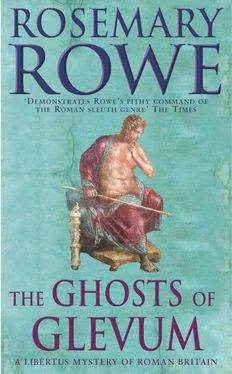Rosemary Rowe - The Ghosts of Glevum
Здесь есть возможность читать онлайн «Rosemary Rowe - The Ghosts of Glevum» весь текст электронной книги совершенно бесплатно (целиком полную версию без сокращений). В некоторых случаях можно слушать аудио, скачать через торрент в формате fb2 и присутствует краткое содержание. Год выпуска: 2013, ISBN: 2013, Издательство: Headline, Жанр: Исторический детектив, на английском языке. Описание произведения, (предисловие) а так же отзывы посетителей доступны на портале библиотеки ЛибКат.
- Название:The Ghosts of Glevum
- Автор:
- Издательство:Headline
- Жанр:
- Год:2013
- ISBN:9781472205100
- Рейтинг книги:3 / 5. Голосов: 1
-
Избранное:Добавить в избранное
- Отзывы:
-
Ваша оценка:
- 60
- 1
- 2
- 3
- 4
- 5
The Ghosts of Glevum: краткое содержание, описание и аннотация
Предлагаем к чтению аннотацию, описание, краткое содержание или предисловие (зависит от того, что написал сам автор книги «The Ghosts of Glevum»). Если вы не нашли необходимую информацию о книге — напишите в комментариях, мы постараемся отыскать её.
The Ghosts of Glevum — читать онлайн бесплатно полную книгу (весь текст) целиком
Ниже представлен текст книги, разбитый по страницам. Система сохранения места последней прочитанной страницы, позволяет с удобством читать онлайн бесплатно книгу «The Ghosts of Glevum», без необходимости каждый раз заново искать на чём Вы остановились. Поставьте закладку, и сможете в любой момент перейти на страницу, на которой закончили чтение.
Интервал:
Закладка:
Rosemary Rowe
The Ghosts of Glevum
I
It had been a long banquet. Course after course of exotic food, all disguised to look like something else. The final offering had consisted of a sow and nine suckling piglets, one for each member of the highest table, all made entirely of sweet almond bread and carried in on an enormous wooden plate by an equally enormous Nubian slave. That had earned a round of spontaneous applause, although it proved better to look at than to eat. Now the remains were being cleared away, the acrobats and jugglers had finished, and a dozen slaves were bringing out fresh bowls of watered wine. Loquex, an elderly poet, was ushered in to read.
I sighed. I knew his eulogies of old. Interminable banalities in lamentable verse. I was rather surprised that he had been engaged for such an important occasion, but of course it had all been organised rather hurriedly. Perhaps no one else was available. Loquex was almost overcome by the solemnity of the honour. He produced a depressingly large and densely written scroll of bark-parchment, and cleared his throat.
‘Marcus Aurelius Septimus, just and fair
Has hooded eyes and curly hair,’
he began — or words to that effect. (It is impossible to convey the full banality of the original Latin.)
In the obscurity of a corner, I shifted uneasily on my banqueting couch. Others, placed nearer the centre of the room, were forced to endure this without fidgeting. I looked at our host, the Marcus Aurelius Septimus in question: the provincial governor’s personal representative, and by far the richest and most influential man for miles around. He was also my patron, so I knew him well, and I could already see the look of resignation glazing those ‘hooded eyes’, and detect frustration in the way that he was fingering the seal-ring on his hand. It was his own fault, of course; he had engaged the wretched local poet in honour of our two distinguished guests.
Loquex was just turning his attention to them:
‘Gaius Praxus came from Gaul
He’s very brave and very tall. .’
Someone on the second highest table — I think it was Balbus, the chief town magistrate, whose brother was rumoured to have served with Praxus’s force — sniggered, but thought better of it and changed it to a cough. I had every sympathy. Of course, this poem was thrown together hastily for this evening, but Loquex did seem in even worse form than usual.
I glanced at Praxus — or Gaius Flaminius Praxus, to give him his full three Latin names. He was tall, one could not deny, but it was not the first word which would spring to mind. Praxus was tall in the way that — say — a small mountainside is tall and he was brave in much the same way — massive, unflinching and immovable, and about as impervious to anything as trivial as pain.
He was reclining at Marcus’s right-hand side, in the place of honour, where he was the first to be served with everything — as well he might. Praxus had recently been transferred from northern Gaul to find himself, pending the arrival of the new provincial governor, the senior officer commanding most of the Roman forces on the western borders of Britannia, including the garrison at Glevum.
This mountain of a man was improbably dressed in a skimpy pale blue synthesis — that fashionable dining robe which was a combination of toga and under-tunic — and wore a floral banqueting wreath lopsided around his head.
The effect was utterly incongruous, but Praxus looked no less menacing for that. However, his square-boned face had for a moment lost its scowl and softened to a glazed expression of amused contempt, but whether that was the effect of the verse, or of Marcus’s excellent Falernian wine, it was — at this distance — impossible to tell.
Loquex was just settling into his stride:
‘And on the left is Mellitus, of course -
Who also earns our thanks and our applause.’
I heard a little ripple run round the room at this, and not just at the dreadful quality of the verse. Loquex had clumsily contrived to draw attention to the fact that Mellitus — the name means honey, but there was nothing remotely honeyed about his character — had been placed on Marcus’s left-hand side, in second position to Praxus as it were. Mellitus would not care for that. I recognised him: a wizened little sub-procurator based in nearby Corinium, and the local expert on taxation and finance. He was famous for his grasping hands and shrewd intelligence and had been a guest here once before. At that time Marcus had made an enormous fuss of him, but tonight was obviously different and Mellitus had been demonstrating his discontent by ostentatiously eating and drinking hardly anything, and greeting all the entertainments with a stony face. Now the unfortunate implication of the verse made matters worse. The sharp eyes narrowed more than ever and the thin lips pursed. It was an awkward moment.
Marcus, however, had seen an opportunity and risen to his feet. Taking his cue from ‘our applause’ he began to clap enthusiastically. I took the hint and did the same, and one by one the other guests joined in.
Loquex coloured, paused, and bowed — delightedly at first, but every time the claps and shouts slowed down Marcus began another round (‘Well done Loquex! What a splendid attempt!’) and after a few moments the poet understood. With a look of disappointment he put his scroll away, and — still bowing — allowed himself to be escorted from the room.
Gaius Flavius, the old ex-councillor seated next to me, gave an approving grunt. ‘Well, let’s hope that’s the last of the entertainments for the night, so the important people can retire to do some serious drinking, and the rest of us can decently go home.’ He sighed. ‘I’m glad that I’m too unimportant to be part of that. It’s obvious that those three aren’t going to get along.’
His voice was not loud, but he spoke into a hush, and I was afraid that everyone would hear. He was drawing startled looks from everyone, as it was, by motioning to a slave to fill his cup, and draining it at a gulp. That was shocking behaviour, especially on a formal occasion such as this, but he seemed oblivious. I realised uneasily that he’d drunk a great deal of sweet watered wine with the dessert and the alcohol was loosening his tongue.
I murmured something non-committal, and tried to look as if these dangerous remarks were not addressed to me.
He refused to let the matter drop. ‘It’s easier for you, Libertus; everybody knows that you’re Marcus’s protégé. And you’re a pavement-maker, anyway — people need mosaics, whoever is in power. But if those three up there start quarrelling, the rest of us will have to choose between them, and I for one shan’t know which horse to hitch my chariot to.’
If there had been a hush before, there was silence now. You could have heard a breadcrumb fall on to the tiled floor. Even the slave with the watered wine, refilling the old man’s goblet for the umpteenth time, paused in his pouring as if turned to stone.
Gaius plunged on, as unstoppable as a runaway cart rattling down a hill. ‘I shall be glad when the new governor is properly installed, and things get back to normal again.’ He drained his cup and held it out once more. ‘What is the situation there, Libertus, do you know?’ His speech was getting rather slurred by now. ‘You’ve got your ear closer to the ground than most of us. Is it true that there has been yet more delay?’
I was aware of twenty pairs of eyes, at least, fastened on me expectantly. Suddenly I wished that I was anywhere but here. The Emperor doubtless had his spies in Glevum, as in every other city of the Empire, and the wrong choice of words could be disastrous. ‘There have been a lot of rumours, Councillor Gaius. .’ I began.
Читать дальшеИнтервал:
Закладка:
Похожие книги на «The Ghosts of Glevum»
Представляем Вашему вниманию похожие книги на «The Ghosts of Glevum» списком для выбора. Мы отобрали схожую по названию и смыслу литературу в надежде предоставить читателям больше вариантов отыскать новые, интересные, ещё непрочитанные произведения.
Обсуждение, отзывы о книге «The Ghosts of Glevum» и просто собственные мнения читателей. Оставьте ваши комментарии, напишите, что Вы думаете о произведении, его смысле или главных героях. Укажите что конкретно понравилось, а что нет, и почему Вы так считаете.












